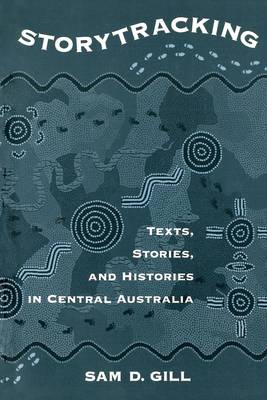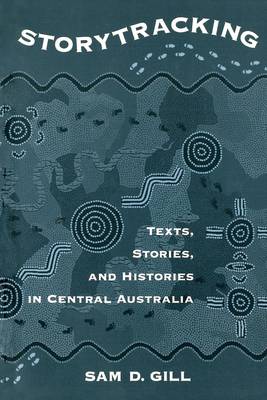
- Afhalen na 1 uur in een winkel met voorraad
- Gratis thuislevering in België vanaf € 30
- Ruim aanbod met 7 miljoen producten
- Afhalen na 1 uur in een winkel met voorraad
- Gratis thuislevering in België vanaf € 30
- Ruim aanbod met 7 miljoen producten
Zoeken
€ 178,45
+ 356 punten
Uitvoering
Omschrijving
Storytracking is a work of theory and application. It is both a study of history and culture and the academic issues accompanying the interpretation and observation of other peoples. Sam Gill writes about Central Australia, but, more importantly, he writes about the business of trying to live responsibly and decisively in a postmodern world faced with irreconcilable diversity and complexity, with undeniable ambiguity and uncertainty.
Storytracking includes engaging accounts of many of the colorful figures involved in the nineteenth-century development of Central Australia, and it is an argument for a multiperspectival theory of history. It presents descriptions of an important aboriginal culture--the Arrernte--and it critically examines ethnography. It exposes the colonialist underbelly of all modern academic culture study, yet it embraces the situation as one of creative potential outlining an interactivist epistemology with which to negotiate the classical alternatives of objectivism and subjectivism. Gill presents an examination of the emergent academic study of religion focused on two exemplary scholars--Mircea Eliade and Jonathan Smith--offering a play theory of religion as the basis for innovative critical discussions of text, comparison, interpretation, the definition of religion, academic writing style, and the role of "the other."
Based on painstakingly detailed research, Gill exposes disturbing and confounding dimensions of the modern world, particularly academia. Yet, beyond the pessimism that often characterizes postmodernity, he charts an optimistic and creative course framed in the terms of play.
Storytracking includes engaging accounts of many of the colorful figures involved in the nineteenth-century development of Central Australia, and it is an argument for a multiperspectival theory of history. It presents descriptions of an important aboriginal culture--the Arrernte--and it critically examines ethnography. It exposes the colonialist underbelly of all modern academic culture study, yet it embraces the situation as one of creative potential outlining an interactivist epistemology with which to negotiate the classical alternatives of objectivism and subjectivism. Gill presents an examination of the emergent academic study of religion focused on two exemplary scholars--Mircea Eliade and Jonathan Smith--offering a play theory of religion as the basis for innovative critical discussions of text, comparison, interpretation, the definition of religion, academic writing style, and the role of "the other."
Based on painstakingly detailed research, Gill exposes disturbing and confounding dimensions of the modern world, particularly academia. Yet, beyond the pessimism that often characterizes postmodernity, he charts an optimistic and creative course framed in the terms of play.
Specificaties
Betrokkenen
- Auteur(s):
- Uitgeverij:
Inhoud
- Aantal bladzijden:
- 304
- Taal:
- Engels
Eigenschappen
- Productcode (EAN):
- 9780195115888
- Verschijningsdatum:
- 12/02/1998
- Uitvoering:
- Paperback
- Formaat:
- Trade paperback (VS)
- Afmetingen:
- 162 mm x 219 mm
- Gewicht:
- 467 g

Alleen bij Standaard Boekhandel
+ 356 punten op je klantenkaart van Standaard Boekhandel
Beoordelingen
We publiceren alleen reviews die voldoen aan de voorwaarden voor reviews. Bekijk onze voorwaarden voor reviews.











